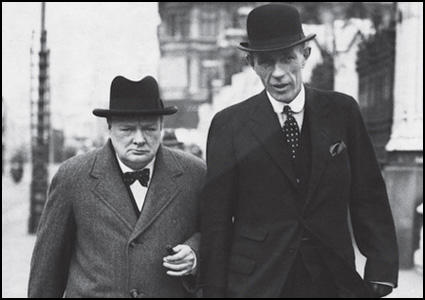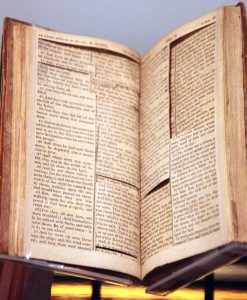Winston Churchill assumed the office of Prime Minister of the United Kingdom on 10 May 1940, just one day after Adolf Hitler marched his German forces into Denmark.1 What followed was a month of brutal bloodshed and agonizing uncertainty throughout the European continent. During this time, Churchill would find his nation on the brink of destruction, Hitler would see victory within his grasp, and a little known historical figure named Edward Wood, 1st Earl of Halifax would beseech his new Prime Minister to seek peace with the Nazi regime.2
Before Churchill took the job, Britain’s Prime Minister was a man named Neville Chamberlain. Chamberlain’s answer to the growing Nazi threat was the path of appeasement. He was not willing to throw his country into conflict so soon after World War I, and so he placated Hitler rather than openly opposing him. One of the most famous examples of this appeasement was the Munich Agreement. This pact, signed by France, Germany, Italy, and Great Britain in an effort to preserve peace on the European continent, effectively forgave Hitler for invading Czechoslovakia. Signed on 29 September 1938, the Munich Agreement stipulated that Hitler would not invade anymore countries; a promise he broke six months later. Blamed for the failure that was the appeasement strategy, Chamberlain was forced to step down from his position as Prime Minister. His successor was widely expected to be none other than his Foreign Secretary, Lord Halifax. Halifax declined the position. Though no one is exactly sure why, it is likely that Halifax felt that he was not suited to lead the country in time of war. 3 Therefore, the nation chose instead to turn to the man who had been the most vocal critic of appeasement: Winston Churchill. 4

Churchill had a daunting task before him as he took the office. Denmark had fallen, and all signs pointed to France following closely behind. One of his first acts as Prime Minister was to appoint a War Cabinet to advise him moving forward. As part of the Cabinet, Churchill appointed Neville Chamberlain as Lord President of the Council and asked Lord Halifax to keep his position as Foreign Secretary. 5 Churchill then sent the British Expeditionary Forces into France to help repel the Nazi invaders. Unfortunately, this move grossly underestimated German military capabilities, and British forces were in full retreat within a matter of weeks.
Since we know how the war ended, it is hard for us to fathom now just how dire Britain’s prospects were at the time. The Expeditionary Force was pinned on the Dunkirk Beach in France with seemingly no way of crossing the channel to get back to England. If the Germans managed to wipe out this force, which seemed imminent, Britain would have lost over 400,000 men and with them any hopes of ever stopping the Nazi conquest. In the face of utter annihilation, Churchill chose to stand firm. He ordered the commandeering of civilian boats to cross the channel and retrieve his soldiers, betting his country’s future on the long odds that these vessels could arrive before it was too late.6 Members of The War Cabinet did not share Churchill’s staunch optimism, most notable among them Lord Halifax.7 Halifax proposed a different tactic: a peace treaty with the Nazis. Halifax, being the skilled diplomat that he was, made contact Benito Mussolini, Prime Minister of Italy. Mussolini was willing to act as mediator so that Germany and the U.K. could sit down and negotiate terms for a peace agreement.8 From Halifax’s perspective this was the only way to ensure the survival of the troops trapped at Dunkirk, and the only way to save his beloved country. Though it seemed foolhardy at the time, Churchill refused to even consider peace negotiations.9 Luckily for him, and for our world, the civilian rescue mission succeeded, managing to bring most of the British troops home. Despite terrible odds, the United Kingdom lived to fight another day.

Assuming things had gone differently, and Churchill gave Halifax the go-ahead to broker a peace agreement, what might the treaty have looked like? The first thing to remember is, by all accounts, Britain was at the time posed to fall to German invasion. This meant that Halifax would have essentially been going to the negotiating table on his knees, making it unlikely that he could produce any favorable terms. Undoubtedly, Hitler would have used his advantageous bargaining position to get everything he wanted out of the deal. In exchange for safely getting the men out of Dunkirk, Nazis would have demanded that they be allowed to keep their conquered claims throughout Denmark, France, and other countries. Hitler also could have insisted that Britain not get further involved in the European conflict, allowing him to march towards Russia without worrying about the possibility of an active western front. Though it is impossible to measure whether 400,000 souls are worth such demands, it is important to keep in mind what precedent this would have set had the U.K. signed a peace treaty with Germany in Munich. Hitler took advantage of the Munich Agreement and disregarded it the moment he saw a tactical opportunity. Surely, no treaty Halifax could draft would have quelled the lust for power harbored by Hitler who stopped at nothing to establish a German world order. 10

All this we know thanks to well preserved historic records and the many biographies written since the war. We know that Churchill’s plan to resist at all costs did indeed pay off in the long run. But, looking at the events of the month of May 1940 through the eyes of the 1st Earl of Halifax, couldn’t one have concluded that the only hope for the United Kingdom was a final attempt at appeasement?
- Winston Churchill, The Gathering Storm (Boston: Houghton Mifflin Company, 1948). ↵
- Chris Hasting, “Lord Halifax tried to negotiate peace with the Nazis.” The Telegraph (August 30, 2008). ↵
- Andrew Roberts, The holy fox: a life of Lord Halifax (London: Papermac, 1992). ↵
- Ian Kershaw, Fateful choices: ten decisions that changed the world, 1940-1941 (London: Penguin Books, 2008). ↵
- Churchill, Winston. The Gathering Storm. (Boston: Houghton Mifflin Company, 1948), and Andrew Roberts, The holy fox: a life of Lord Halifax (London: Papermac, 1992). ↵
- Winston Churchill, The Gathering Storm (Boston: Houghton Mifflin Company, 1948). ↵
- Andrew Roberts, The holy fox: a life of Lord Halifax (London: Papermac, 1992). ↵
- Andrew Roberts, The holy fox: a life of Lord Halifax (London: Papermac, 1992). ↵
- Ian Kershaw, Fateful choices: ten decisions that changed the world, 1940-1941, (London: Penguin Books, 2008). ↵
- Arnold A Offner, “Appeasement Revisited: The United States, Great Britain, and Germany, 1933-1940.” The Journal of American History 64, no. 2 (1977): 373-93. ↵



90 comments
Michael Thomas
I found this article interesting because of how it details the failed peace agreement between Great Britain and Nazi Germany. Neville Chamberlain thought making peace with the Nazi’s would end their conquest in Europe. However, that was not the case. After England had celebrated their deal to end the Nazi’s conquest, they received bad news. The Nazi’s went back to their conquest after six months. When Winston Churchill became Prime Minister of Great Britain, he took a more aggressive approach against the Germans. Overall, this article was good and informative.
Austin Pena
Congrats on your nomination and this was a great article. I enjoy learning about WWII and all that caused it because it wad a horrible time in our history as humans. You did an amazing job of writing this out and making so I was invested and interested in the article from the first few sentences. The images selected also help paint a picture in my head of this story, and the Dr. Seuss comic was a nice addition.
Marlene Lozano
This was an interesting and well-written article to read! World War II has always fascinated me because of all the history that happens in this period. This treaty could have changed the outcome of the war and the course of history maybe for the better. If this treaty were to happen many lives would have been able to be saved a lot sooner. It is surprising that we don’t fully know what went on behind the scenes.
Peter Coons
It’s impossible to think of how different the world would be today if the British had continued to placate the German war machine in Europe. It is almost certain that if Hitler had held off on Operation Barbarossa and secured his western flank, that all of Europe would more or less be under Nazi occupation or a Nazi puppet state by the end of the 1940s. Churchill did not allow this, and the amazing flotilla formed to rescue the British at Dunkirk and the great PR campaign used to keep spirits up during the Blitz kept the Reich stretched too far on two fronts, and ushered in the ghost of World War 1’s failures. A great article about an often forgotten piece of foreign policy.
Destiny Renteria
The author gives a great descriptive of this era and very well knew how to tell a story. I was intrigued from the beginning. The pictures are especially what drew me in and I am glad the author chose them. I also never knew about this so to be educated on this is very pleasing for me and I hope for other students. The author wrote this so well I did not get tired of reading it. Keep up the good work!
Vanessa Tombo
As my mother always says ” to tell a story you must arrange, then weave every letter in a skillful manner and most importantly you must create fantastic and beautiful images”. From the first sentence to the last I could vividly see the images of this political era. The author’s skillful use of tone and diction place this article at the top of my favorites’ list. The author demonstrates how Winston Churchill, prime minister of Britain tried to stand up against Hitler.
Isaac Saenz
The comic illustrated by Dr. Seuss does an exemptional job at explaining the situation. After Hitler broke his agreement of the first treaty, what in the world would make Halifax believe a second treaty would work? Perhaps it was fear, nonetheless, I am thankful that this treaty indeed never happened and can only imagine what would have happened if the British army wasn’t saved that day.
Vanessa Tombo
As my mother always says ” to tell a story you must arrange, then weave every letter in a skillful manner but most importantly you must create fantastic and beautiful images”. From the first sentence to the last I could vividly see the images of this political era. The author’s skillful use of tone and diction place this article at the top of my favorites’ list.
Cristina Cabello
This is a really good article about Winston Churchill. I recently watched a movie about him. It was a pretty dry movie, in my opinion, but was very informative. I liked how you developed this article. Your first paragraph really sets a good image of what happened. I also watched the movie about Dunkirk. It is really good to read and watch over both sides of these topics. It helped me to understand what was going on at this time.
Samire Adam
What a fascinating topic this was. As I continue to read the article, I was forced to think “What if” the treaty was signed. I have no doubt that it would have given Nazi the advantage over Europe and reason to defeat the British force at Dunkirk beach. I can’t help but think that we probably be learning about the Second World War from the German point as war are often time told from the winner side.